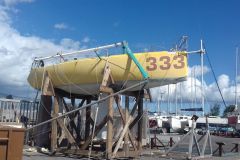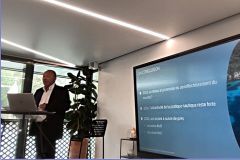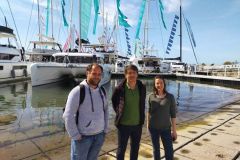Un accord dans la branche nautisme pour l'APLD
Les partenaires sociaux de la branche nautique ont finalisé le 18 décembre 2020 un accord sur le dossier de l'activité partielle de longue durée (APLD). Il a été signé du côté du patronat par la Fédération des Industries Nautiques (FIN) et par la CFDT et CFE-CGC pour les salariés, la CGT, FO et la CFTC refusant de parapher le texte. Son entrée en vigueur devrait intervenir avant le 1er février 2021. "Notre but après la signature de la convention collective cet automne, était d'obtenir un accord de branche sur l'APLD assez tôt pour anticiper la réforme du système général" explique Louis-Guillaume Sabatier, responsable juridique au sein de la FIN. L'avis d'extension de l'accord d'ici au 1er février devrait intervenir avant la bascule du régime général, plusieurs fois reporté.
Limiter le reste à charge des entreprises du nautisme
Le texte de l'accord permet de maintenir pour les entreprises de la filière plaisance les conditions actuelles de prise en charge de l'Etat (60% du salaire brut) et pour le salarié (70% du salaire brut). La durée maximale est de 24 mois sur un total de 36 mois consécutifs, avec un renouvellement tous les 6 mois, soumis à l'approbation de la DIRECCTE. "Il était important de limiter le reste à charge pour les entreprises, qui serait passé à presque 50% avec la réforme, contre 15 % avec l'accord de branche. On garde un dispositif qui est favorable aux entreprises et aux employés" se félicite Louis-Guillaume Sabatier.

Former aux nouveaux métiers de la plaisance
En parallèle, l'accord incite les entreprises à utiliser les heures chômées pour la formation de leurs salariés et préparer les évolutions du marché de la plaisance. "On les encourage à former aux métiers en tension ou d'avenir, dans le domaine de la révolution numérique ou de la transition écologique notamment" précise le responsable juridique de la FIN.
Un accord applicable dans la durée
Si la FIN n'a pas de statistiques sur le recours à l'APLD dans le nautisme depuis le début de la crise de la Covid-19, elle précise répondre à un besoin de la filière et des petites entreprises du secteur. Le texte est applicable pour des demandes jusqu'en juin 2022, et une mise en œuvre d'APLD jusqu'en 2025. "On espère évidemment que les entreprises n'auront pas à applique l'APLD jusque là. On n'a pas de chiffres précis sur les entreprises de la filière qui y ont eu recours, mais l'on avait des demandes à l'automne, surtout d'entreprises de tailles limitées pour lesquelles un accord d'entreprise était complexe. On se tient désormais prêt à répondre aux questions du terrain" conclut Louis-Guillaume Sabatier.













